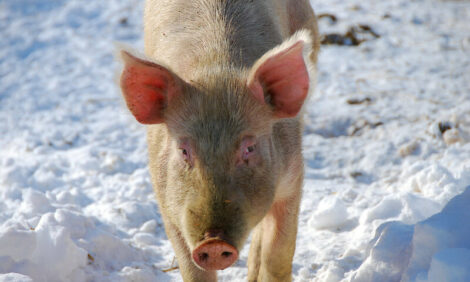



RSPCA Welcomes Pledge to Scrap Sow Stalls
AUSTRALIA - The RSPCA has described the pork industry's vote to phase out sow stalls as a momentous day for pigs in Australia.Australia's industry has gone on the front foot to try and win consumer support, by commiting to voluntarily end use of sow stalls by 2017, reports ABC.
At its annual general meeting, the peak research and marketing body, Australian Pork Limited, agreed the phase-out would give local producers a marketing edge over imports.
Britain is so far the only country in the world to have a blanket ban on sow stalls, and Australia's industry will seek funding from government and retailers to make changes to pig housing, which it estimates will cost producers $95 million.
APL chief executive Andrew Spencer says although the commitment is voluntary, he believes farmers will support it.
"And the market will move in that direction, and it is moving in that direction," he said.
"If pig producers want to continue selling their pigs, they're going to have to have plans in place to move away from the use of gestation stalls.
"I'm pretty sure most of the money will come from producers.
"This is a committment we can't make on behalf of taxpayers, but we do believe there are areas they can help, but this is going to be a huge cost to the industry.
"There's no way we'll get around that."
RSPCA chief executive Heather Neil is not worried that the wording of the APL resolution is ambiguous, because, she says, consumers and supermarkets are sending signals to the industry.
She says the difficulties with group housing will be worked out, with research funded by Australian Pork Limited.
"The APL has actually invested in significant research with the animal welfare science centre, which was completed last year," she said.
"It is looking at ways they can have group housing and have high pregnancy retention rates."
A pig producer at Young in NSW says consumers won't pay the extra costs for pork produced without sow stalls.
Edwina Beveridge is disappointed and believes it won't satisfy the animal rights movement.
The Beveridge family has built new sheds with sow stalls at a cost of $3 million.
She says they have larger pens, but they're now prepared to open the gates to comply with new codes of practice.
But she says it will cost them more.
"Not only is it the cost of changing our sheds and our systems, there will be an extra cost in production," she said.
"Because a sow that is housed in group housing has a greater risk of losing its pregnancy and ultimately will cost us more money, it's harder to provide good animal husbandry."
Paul Taylor owns a medium-sized, 500-sow piggery at Gayndah, north of Brisbane.
Mr Taylor has been in the industry for over 25 years, and was in Canberra yesterday as one of Queensland's representatives on Australian Pork Limited.
He says he's content with the industry decision.
"Happy mightn't be the right word, but certainly contented; it's the way our markets are indicating we have to go and so we're happy to go down that path," he said.
"As an individual producer we estimate that, per sow space, (moving away from sow stalls) could cost between one and two thousand dollars.
"We already comply with the existing code and, for the last three years, have done a lot of refurbishment and rebuilding, so we're already part of the way there.
"We have six weeks of stalls and the rest is batch accomodiation for the sows, but it does mean we'll have to reconfigure another shed and build another shed to allow for the extra space requirements".
But Mr Taylor says "government assistance or not, we will absolutely phase out sow stalls sooner rather than later. We just feel it's part of the cost of business, and the welfare of our animals has always been paramount".
He thinks some producers will take this opportunity to exit pig production rather than face the higher costs, or they may remain in the industry, but switch their focus to becoming "grow-out facilities" for the bigger operators.
A Canadian business consultant says Australian Pork Limited's decision could have an impact on agriculture internationally.
Alberta-based Lance Johnson heads up a consulting firm that specialises in agriculture research and strategic planning.
He says he was particularly interested in the APL's decision, because Canada is a large pork exporting nation.
Mr Johnson says the decision doesn't surprise him and it will influence the direction of the Canadian pork industry.
"It'll certainly put pressure on Canada to follow the same path as Australia, and Canada would be likely to follow suit so that we can compete in the same export markets".
He says there are further implications for other intensive livestock industries as public pressure and consumer sentiment force changes in agriculture practice.
Mr Johnson says it highlights the power animal rights and liberation groups wield.
"In Canada, we see a tremendous amount of pressure from the public starting to influence policy more so all the time," he said.
"This stems from the global communications that are so easily accessible these days.
"Ideas travel very quickly and tend to be extremely short."
"140 characters or less via Twitter for example, and so it's really hard to educate the public about issues fully and let them understand it completely before they form opinions.
"So we just don't have the luxury of allowing the public to have these small sound bites from special interest groups that will have strong implications for the industry."
The Canadian consultant sees fragmentation of many agricultural commodities by industry groups with different goals as an issue.
Further Reading
|
| - | Go to our previous news item on this story by clicking here. |








